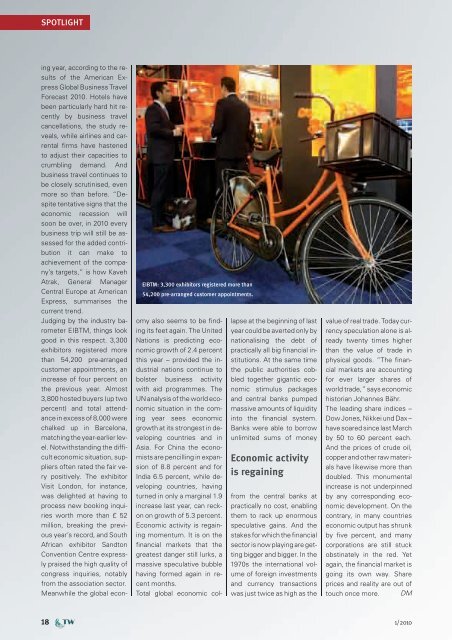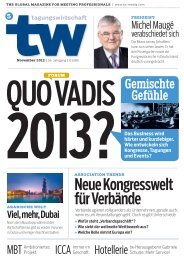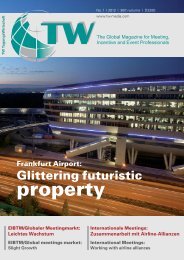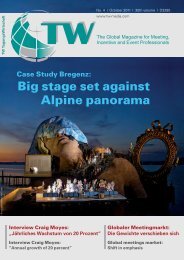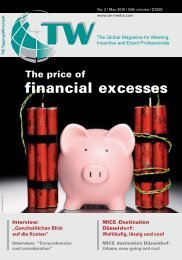Our industry celebrates diversity – but demands consistent quality.
Our industry celebrates diversity – but demands consistent quality.
Our industry celebrates diversity – but demands consistent quality.
You also want an ePaper? Increase the reach of your titles
YUMPU automatically turns print PDFs into web optimized ePapers that Google loves.
SPOTLIGHT<br />
ing year, according to the results<br />
of the American Express<br />
Global Business Travel<br />
Forecast 2010. Hotels have<br />
been particularly hard hit recently<br />
by business travel<br />
cancellations, the study reveals,<br />
while airlines and carrental<br />
firms have hastened<br />
to adjust their capacities to<br />
crumbling demand. And<br />
business travel continues to<br />
be closely scrutinised, even<br />
more so than before. “Despite<br />
tentative signs that the<br />
economic recession will<br />
soon be over, in 2010 every<br />
business trip will still be assessed<br />
for the added contri<strong>but</strong>ion<br />
it can make to<br />
achievement of the company’s<br />
targets,” is how Kaveh<br />
Atrak, General Manager<br />
Central Europe at American<br />
Express, summarises the<br />
current trend.<br />
Judging by the <strong>industry</strong> barometer<br />
EIBTM, things look<br />
good in this respect. 3,300<br />
exhibitors registered more<br />
than 54,200 pre-arranged<br />
customer appointments, an<br />
increase of four percent on<br />
the previous year. Almost<br />
3,800 hosted buyers (up two<br />
percent) and total attendance<br />
in excess of 8,000 were<br />
chalked up in Barcelona,<br />
matching the year-earlier level.<br />
Notwithstanding the difficult<br />
economic situation, suppliers<br />
often rated the fair very<br />
positively. The exhibitor<br />
Visit London, for instance,<br />
was delighted at having to<br />
process new booking inquiries<br />
worth more than £ 52<br />
million, breaking the previous<br />
year’s record, and South<br />
African exhibitor Sandton<br />
Convention Centre expressly<br />
praised the high <strong>quality</strong> of<br />
congress inquiries, notably<br />
from the association sector.<br />
Meanwhile the global econ-<br />
EIBTM: 3,300 exhibitors registered more than<br />
54,200 pre-arranged customer appointments.<br />
omy also seems to be finding<br />
its feet again. The United<br />
Nations is predicting economic<br />
growth of 2.4 percent<br />
this year <strong>–</strong> provided the industrial<br />
nations continue to<br />
bolster business activity<br />
with aid programmes. The<br />
UN analysis of the world economic<br />
situation in the coming<br />
year sees economic<br />
growth at its strongest in developing<br />
countries and in<br />
Asia. For China the economists<br />
are pencilling in expansion<br />
of 8.8 percent and for<br />
India 6.5 percent, while developing<br />
countries, having<br />
turned in only a marginal 1.9<br />
increase last year, can reckon<br />
on growth of 5.3 percent.<br />
Economic activity is regaining<br />
momentum. It is on the<br />
financial markets that the<br />
greatest danger still lurks, a<br />
massive speculative bubble<br />
having formed again in recent<br />
months.<br />
Total global economic col-<br />
lapse at the beginning of last<br />
year could be averted only by<br />
nationalising the debt of<br />
practically all big financial institutions.<br />
At the same time<br />
the public authorities cobbled<br />
together gigantic economic<br />
stimulus packages<br />
and central banks pumped<br />
massive amounts of liquidity<br />
into the financial system.<br />
Banks were able to borrow<br />
unlimited sums of money<br />
Economic activity<br />
is regaining<br />
from the central banks at<br />
practically no cost, enabling<br />
them to rack up enormous<br />
speculative gains. And the<br />
stakes for which the financial<br />
sector is now playing are getting<br />
bigger and bigger. In the<br />
1970s the international volume<br />
of foreign investments<br />
and currency transactions<br />
was just twice as high as the<br />
value of real trade. Today currency<br />
speculation alone is already<br />
twenty times higher<br />
than the value of trade in<br />
physical goods. “The financial<br />
markets are accounting<br />
for ever larger shares of<br />
world trade,” says economic<br />
historian Johannes Bähr.<br />
The leading share indices <strong>–</strong><br />
Dow Jones, Nikkei und Dax <strong>–</strong><br />
have soared since last March<br />
by 50 to 60 percent each.<br />
And the prices of crude oil,<br />
copper and other raw materials<br />
have likewise more than<br />
doubled. This monumental<br />
increase is not underpinned<br />
by any corresponding economic<br />
development. On the<br />
contrary, in many countries<br />
economic output has shrunk<br />
by five percent, and many<br />
corporations are still stuck<br />
obstinately in the red. Yet<br />
again, the financial market is<br />
going its own way. Share<br />
prices and reality are out of<br />
touch once more. DM<br />
18 1/2010


